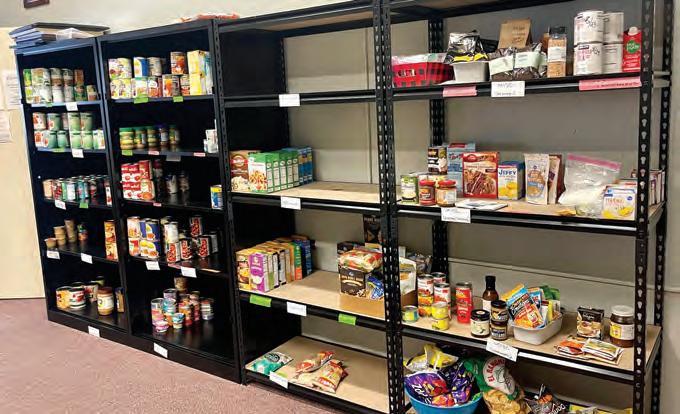
5 minute read
eA r T h In c r I s I s | op I n I on Inspired To Action
Grim Reports From The Climate Action Front Include A Few Glimmers Of Hope
By Tracey MacDermott For the GPHN
Advertisement
The Inflation Reduction Act of 2022 is the biggest climate legislation ever passed in U.S. history. Although this landmark legislation wasn’t perfect, it provided a jumpstart on tackling our climate emergency. However, recent news regarding the Colorado River and the Intergovernmental Panel on Climate Change’s (IPCC) 6th Synthesis report paints a grim future.
A recent study published in the journal Geophysical Research Letters notes that the 22-year drought in the Upper Colorado River Basin has been severe. Tree ring analysis reveals the most severe drought in the past 1,200 years.
In August of 2021, the Bureau of Reclamation declared the first-ever water shortage for the area. Colorado’s snowpack from this past winter notwithstanding, reduced precipitation and rising temperatures have been estimated to account for approximately one-third of the decrease in the river. The ongoing drought impacts the availability of water for homes and agriculture, as well as a decrease in hydroelectric power. The picture that is being drawn for the southwest is bleak and requires immediate mitigation.
Last month the Biden Administration announced proposed reductions in water supplies to states in the southwest. The proposal evenly cuts water to California, Arizona and Nevada, and marks an unprecedented move. The Great Salt Lake has lost half of its water volume over the last 150 years. Lake Mead has fallen to record lows due to human consumption and a mega drought worsened by climate change. The current use of the Colorado River is simply not sustainable and with 40 million Americans relying on this water source, saving it from further decline is imperative.
So, what can you do? Here are some basic tips:
• Switch your bath to a shower a nd t ry to keep it to under 4 minutes.
• Turn off t he t ap when brushing your teeth.
• Run your d ishwasher only when it is f ull.
• Use leftover cooking water on your plants a nd in the garden.

• Fix leaky taps.
• Install low flow aerators on your taps a nd showers.
• Don’t flush t he toilet a fter every go. If it’s yellow, it’s mellow.
• Re-wear your clothes i f t hey a re still clean.
• Install a rain barrel.
• Stop using bottled water.
• Don’t let t he tap r un when hand-washing d ishes. When you do run the tap, collect the water by putting a bowl under it.
• Convert your lawn to d rought tolerant plants and grasses.
• Get creative!
Global temperatures are now 1.1° Celsius and it is likely we will hit the critical 1.5° C increase in the next decade. Melting Arctic ice is one of the main reasons why we must keep below the 1.5° C target. Using the Fahrenheit scale, 1.5° C translates to 2.7° F. In Fahrenheit, our summer season has already warmed 2.6° F in Colorado since 1970. This has led to more extreme heat days.
The most recent Intergovernmental Panel on Climate Change report didn’t have a lot of good news, with some of it underscoring what’s previously been confirmed. Katharine Hayhoe, a world-renowned climate scientist summed up the key takeaways:
1) Climate change has already caused widespread and substantial losses to almost every aspect of human life on this planet. The impacts on future generations depend on the choices we make now.
2) Every bit of warming matters. The warmer the planet gets, the more widespread and pronounced the changes in both average climate and climate and weather extremes become.
3) The impacts are very serious: they directly affect our health, our food sources, our water and more.
4) The percentage of animal species exposed to potentially dangerous conditions increases significantly the faster the world warms. In general, ocean species like coral and tropical species are most at risk.
“The synthesis report is clear: we are not doing nearly enough to avoid dangerous impacts,” Hayhoe said.
In her summation, however, she did provide a point of hope: Many of the solutions, she noted, are (a) already available today, and (b) benefit us in so many ways — addressing health, equity, justice, and even economic concerns while increasing resilience and accelerating the transition to a clean energy future.
Each one of us can act, make sweeping changes in our lifestyles and secure a livable future. We must!
Tracey MacDermott is an at-large member of the board of Greater Park Hill Community, Inc., and immediate past chair. She was trained as a Climate Reality Leader in 2017, and is currently the Statewide Co-Chair of the Climate Reality Project for the 100% Committed Campaign.
Purring Into The Near-future
Battery Technology Breakthroughs Made The EV Revolution Possible
By Mark Kuhl
For the GPHN
Are you excited about your next car being an Electric Vehicle?
There are plenty to choose from now and EV drivers love the many benefits of their new ride, especially the fact there’s no exhaust pipe. They’re fun to drive, quiet, low maintenance, and never need an oil change or to be filled up with gas.
Battery technology breakthroughs made this EV revolution possible, and new electric car sales are estimated to be 30 percent to 50 percent of all purchases in the U.S. by 2030 — that’s just seven years from now.
EV batteries last up to 150,000 miles and after time powering your ride they can be repurposed for stationary power storage. Eventually they lose so much capacity they are deemed useless and ready for recycling. Cobalt and lithium are the materials worth recovering and a young EV battery recycling industry is improving the highly manual, dangerous, and expensive process of doing so.
To accelerate the pace of recycling innovation, proactive states like California have formed expert groups to devise new and more efficient methods of battery recycling.
Mark Kuhl is an environmental advocate who lives in Park Hill with his family. His handy tips and news about recycling household items appear every month in these pages. A directory of his past columns for recycling everything from paint to Styrofoam to shoes is at greaterparkhill.org/sustainability/recyclingdirectory/.
Darrell Watson
MAKING CITY GOVERNMENT
WORK FOR DISTRICT
VOTE FOR WATSON FOR DENVER CITY COUNCIL DISTRICT 9 ON JUNE 6.




PAID FOR BY WATSON FOR DENVER.
DISTRICT 9 WANTS PROGRESS, NOT DIVISION.
"Denver is at a crossroads, and our city is changing in ways that seemed unimaginable ten years ago. Our crime stats paint a sobering picture, including that Denver is #1 in car thefts. Our violent crime rate is up 10%, drug-related crimes increased 24% (both in 2022), and our high schools are being threatened by gun violence. As your next council member, I will lead and work in partnership to address the public safety concerns of our communities. I’ll work with the Denver Police Department to ensure that officers hired represent the communities they serve; I will fund alternative responses to DPD to nonviolent interactions; I will implement police reforms; and I will increase community health funding. This is how we will create a safer, more just District 9 where each and every one of us can thrive."
Vision For District 9












